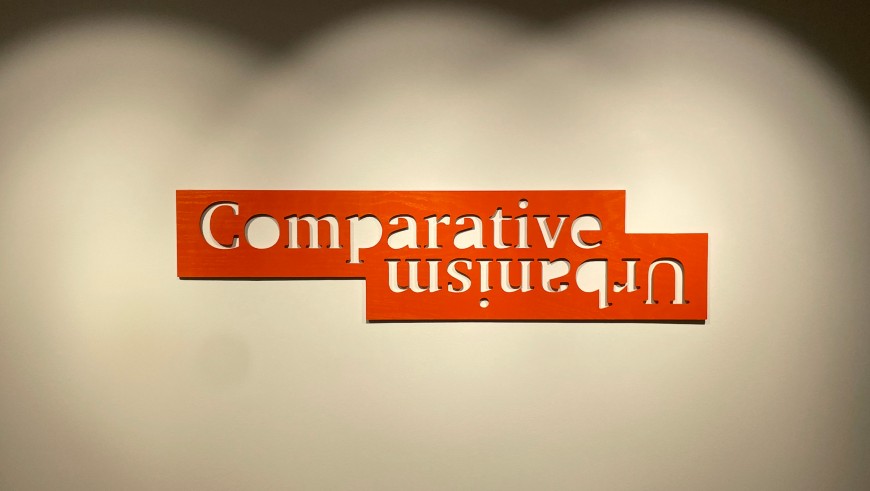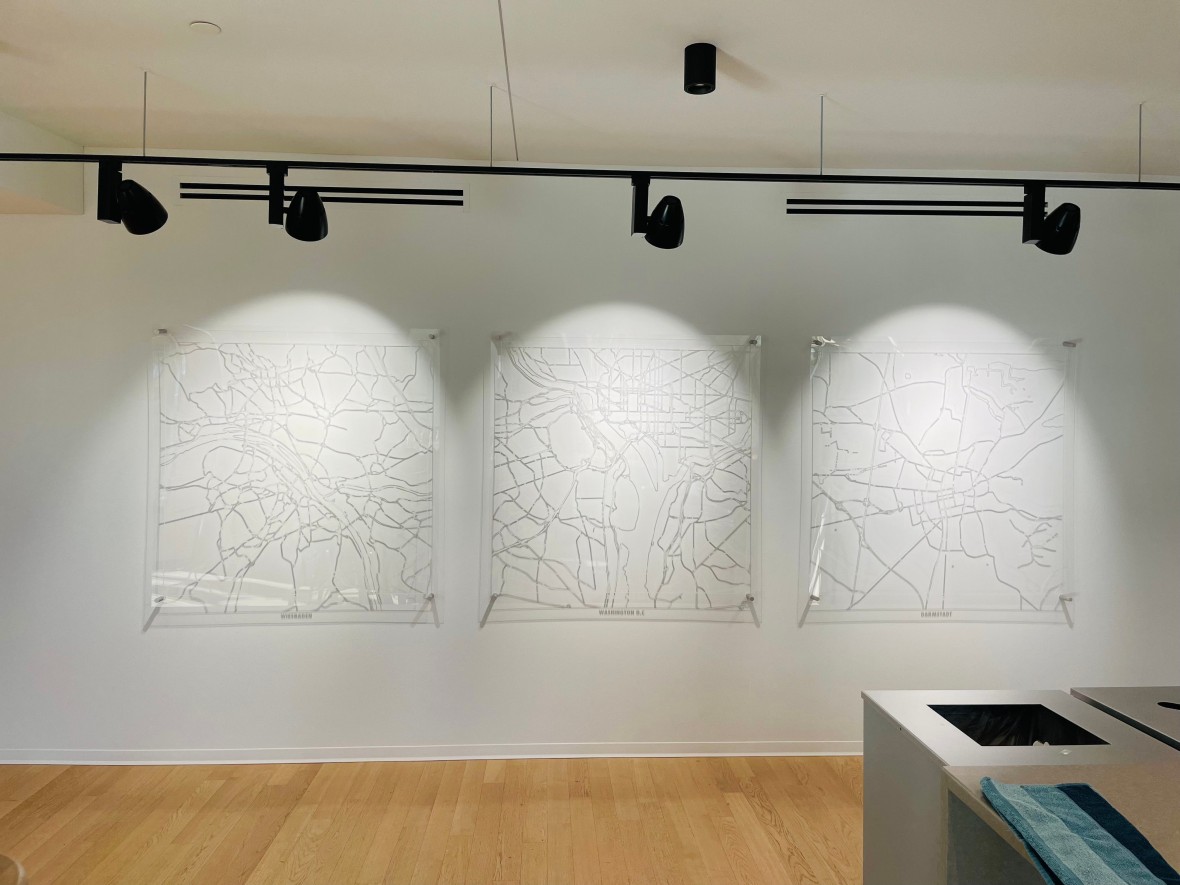Comparative urbanism – exhibition opens in Washington DC
Celebrating Transatlantic Collaboration between students and staff from TU Darmstadt and Virginia Tech
2023/02/07

One important lesson from the Covid-19 epidemic was that public space is vital as meeting hubs, engage with the community, support public health, and become physically active.
In 2021 and 2022, students and faculty from the Department of Architecture at TU Darmstadt & Virginia Tech’s Washington – Alexandria Architecture Center (WAAC) worked collaboratively and across the universities to explore urban research methodologies and study accessibility and health in public space. In 2021, the seminar series around the Chair of Urban Design and Planning (Prof. Knöll) focused on accessibility comparing cities and public space in the metropolitan regions of Frankfurt and Washington, DC. The following year, in 2022, the seminar centered on “healthy cities” through investigation of the cities Wiesbaden and Alexandria. These joint seminars has intensified the long-standing, strategic partnership between the two universities, involving students and their perspectives and thereby opening up many new avenues for studying public life in cities.
The Goethe-Institut Washington DC presents the results in form of a poster exhibit focusing on different aspects of comparative urbanism, and touching upon important aspects of often unnoticed structures. By raising questions and new perspectives, this exhibit wants to inspire an ongoing discourse of comparative urban research.
Thu, 02/09/2023
18:00 Uhr
Goethe-Institut Washington @ The Liz
1377 R St. NW, Ste. 300
Washington, DC 20009
https://www.goethe.de/ins/us/en/sta/wsh/ver.cfm?event_id=24500713
The results of the seminars are also presented in two online publications: Public Life Studies , 2021 / The Healthy City , 2022
About the initiative Transatlantic Architectural Discourse
The initiative “Transatlantic Architectural Discourse” of the Department of Architecture at the TU Darmstadt aims to support collaborative teaching initiatives between faculty members of the department and those of universities in the Americas.
The cooperation with Virginia Tech on the joint seminar “Comparative Urbanism” is a test run for future collaborations of our department. Students from both departments participated in the transatlantic course in which they designed and developed research projects to identify similarities and differences in urban design in the United States and Germany.
“Comparative Urbanism” is funded by the DAAD (Deutscher Akademischer Austauschdienst) through the IVAC program (International Virtual Academic Collaboration), which is initiated and steered from the International Office at the Department of Architecture (IO(A)). IVAC aims to enhance the academic collaboration between German Universities and international partners through the exploration of digital tools and platforms that facilitate the collective learning experience.
About the seminars
Comparative Urbanism 2021: Public Life Studies
In this seminar, students designed and developed their own research project with the aim to identify similarities and differences of urban design and public space usage and accessibility in the US and Germany. It was an introduction to research methodologies in urban design with a focus of gaining fresh empiric data (e.g. observations, counting, interviews, comparative studies etc.). Research methods leading to a theoretical framework and allowing to contextualize the empiric findings were applied by students.
Darmstadt
https://issuu.com/transatlantic-discourse/docs/comparative-urbanism
Comparative Urbanism 2022: The Healthy City
In this seminar, students explored and understood the concept of healthy cities, its current challenges, and possible actions and interventions. In addition, students designed and developed a collaborative group research project through comparative research with the aim to identify and analyze a specific problem related to the concept of “The Healthy City” in both Germany and the United States, and each group concluded their research with some recommendations and visions. It is an introduction to research methodologies in urban design with a focus of gaining fresh empiric data (e.g. observations, counting, interviews, comparative studies etc.). Research methods leading to a theoretical framework and allowing to contextualize the empiric findings will be applied by students.
Wiesbaden
https://issuu.com/transatlantic-discourse/docs/221114_cu_healthy_city-issuu
The course format was a combination of lectures, seminars, and collaborative project work. Although there were online lectures, the course was based on a self-initiated group research project, gathering empirical data through different methods used in the urban planning field and the evaluation and analysis of the data. Active participation in academic discussion surrounding course content and student projects was a critical component of the course.
The course was held in an online form (video-conference + online learning platform). Most of the learning material was uploaded on the online platform in order to offer students the flexibility to learn whenever it suits for them. Nevertheless, there were appointments where the online presence is required.
Students worked in tandems (e.g. 2 students from Germany and 2 from the U.S.) to design and develop a research project with the same topic but in two different locations. The objective of this form of work was to allow the performance of an analysis and comparison between two public spaces in two different cities (Washington and Darmstadt). The comparison should encompass the differences and similarities among the natural, cultural, and economic and legal forces that underlie the access and usage of public spaces. It was up to the students to self-organize format, times and working tools in their teams. The teams, and with faculty guidance, selected one space in each city to work on.
Partners
Virginia Polytechnic Institute and State University, (Virginia Tech)
Washington-Alexandria Architecture Center (WAAC), School of Architecture of Archiecture + Design
Prof. Susan Piedmont-Palladino
Scott Archer, MS.Arch.-Urban Design
Urban Affairs and Planning (UAP), School of Public and International Affairs
Prof. Ralph Buehler
Prof. Paul Kelch
https://archdesign.caus.vt.edu/waac/
https://spia.vt.edu/programs/uap.html
TU Darmstadt
Chair of Urban Design and Planning
Prof. Dr.-Ing. Martin Knöll
ao. Prof. Dr. Sabine Hopp
Gladys Vásquez Fauggier, M.Sc.
https://www.architektur.tu-darmstadt.de/urbandesign
International Office at the Department of Architecture
Dipl.-Ing. Arch. Valentina Visnjic Lang
Anna Luise Schubert, M.Sc.






